RBS 2012 Annual Report Download - page 508
Download and view the complete annual report
Please find page 508 of the 2012 RBS annual report below. You can navigate through the pages in the report by either clicking on the pages listed below, or by using the keyword search tool below to find specific information within the annual report.-
 1
1 -
 2
2 -
 3
3 -
 4
4 -
 5
5 -
 6
6 -
 7
7 -
 8
8 -
 9
9 -
 10
10 -
 11
11 -
 12
12 -
 13
13 -
 14
14 -
 15
15 -
 16
16 -
 17
17 -
 18
18 -
 19
19 -
 20
20 -
 21
21 -
 22
22 -
 23
23 -
 24
24 -
 25
25 -
 26
26 -
 27
27 -
 28
28 -
 29
29 -
 30
30 -
 31
31 -
 32
32 -
 33
33 -
 34
34 -
 35
35 -
 36
36 -
 37
37 -
 38
38 -
 39
39 -
 40
40 -
 41
41 -
 42
42 -
 43
43 -
 44
44 -
 45
45 -
 46
46 -
 47
47 -
 48
48 -
 49
49 -
 50
50 -
 51
51 -
 52
52 -
 53
53 -
 54
54 -
 55
55 -
 56
56 -
 57
57 -
 58
58 -
 59
59 -
 60
60 -
 61
61 -
 62
62 -
 63
63 -
 64
64 -
 65
65 -
 66
66 -
 67
67 -
 68
68 -
 69
69 -
 70
70 -
 71
71 -
 72
72 -
 73
73 -
 74
74 -
 75
75 -
 76
76 -
 77
77 -
 78
78 -
 79
79 -
 80
80 -
 81
81 -
 82
82 -
 83
83 -
 84
84 -
 85
85 -
 86
86 -
 87
87 -
 88
88 -
 89
89 -
 90
90 -
 91
91 -
 92
92 -
 93
93 -
 94
94 -
 95
95 -
 96
96 -
 97
97 -
 98
98 -
 99
99 -
 100
100 -
 101
101 -
 102
102 -
 103
103 -
 104
104 -
 105
105 -
 106
106 -
 107
107 -
 108
108 -
 109
109 -
 110
110 -
 111
111 -
 112
112 -
 113
113 -
 114
114 -
 115
115 -
 116
116 -
 117
117 -
 118
118 -
 119
119 -
 120
120 -
 121
121 -
 122
122 -
 123
123 -
 124
124 -
 125
125 -
 126
126 -
 127
127 -
 128
128 -
 129
129 -
 130
130 -
 131
131 -
 132
132 -
 133
133 -
 134
134 -
 135
135 -
 136
136 -
 137
137 -
 138
138 -
 139
139 -
 140
140 -
 141
141 -
 142
142 -
 143
143 -
 144
144 -
 145
145 -
 146
146 -
 147
147 -
 148
148 -
 149
149 -
 150
150 -
 151
151 -
 152
152 -
 153
153 -
 154
154 -
 155
155 -
 156
156 -
 157
157 -
 158
158 -
 159
159 -
 160
160 -
 161
161 -
 162
162 -
 163
163 -
 164
164 -
 165
165 -
 166
166 -
 167
167 -
 168
168 -
 169
169 -
 170
170 -
 171
171 -
 172
172 -
 173
173 -
 174
174 -
 175
175 -
 176
176 -
 177
177 -
 178
178 -
 179
179 -
 180
180 -
 181
181 -
 182
182 -
 183
183 -
 184
184 -
 185
185 -
 186
186 -
 187
187 -
 188
188 -
 189
189 -
 190
190 -
 191
191 -
 192
192 -
 193
193 -
 194
194 -
 195
195 -
 196
196 -
 197
197 -
 198
198 -
 199
199 -
 200
200 -
 201
201 -
 202
202 -
 203
203 -
 204
204 -
 205
205 -
 206
206 -
 207
207 -
 208
208 -
 209
209 -
 210
210 -
 211
211 -
 212
212 -
 213
213 -
 214
214 -
 215
215 -
 216
216 -
 217
217 -
 218
218 -
 219
219 -
 220
220 -
 221
221 -
 222
222 -
 223
223 -
 224
224 -
 225
225 -
 226
226 -
 227
227 -
 228
228 -
 229
229 -
 230
230 -
 231
231 -
 232
232 -
 233
233 -
 234
234 -
 235
235 -
 236
236 -
 237
237 -
 238
238 -
 239
239 -
 240
240 -
 241
241 -
 242
242 -
 243
243 -
 244
244 -
 245
245 -
 246
246 -
 247
247 -
 248
248 -
 249
249 -
 250
250 -
 251
251 -
 252
252 -
 253
253 -
 254
254 -
 255
255 -
 256
256 -
 257
257 -
 258
258 -
 259
259 -
 260
260 -
 261
261 -
 262
262 -
 263
263 -
 264
264 -
 265
265 -
 266
266 -
 267
267 -
 268
268 -
 269
269 -
 270
270 -
 271
271 -
 272
272 -
 273
273 -
 274
274 -
 275
275 -
 276
276 -
 277
277 -
 278
278 -
 279
279 -
 280
280 -
 281
281 -
 282
282 -
 283
283 -
 284
284 -
 285
285 -
 286
286 -
 287
287 -
 288
288 -
 289
289 -
 290
290 -
 291
291 -
 292
292 -
 293
293 -
 294
294 -
 295
295 -
 296
296 -
 297
297 -
 298
298 -
 299
299 -
 300
300 -
 301
301 -
 302
302 -
 303
303 -
 304
304 -
 305
305 -
 306
306 -
 307
307 -
 308
308 -
 309
309 -
 310
310 -
 311
311 -
 312
312 -
 313
313 -
 314
314 -
 315
315 -
 316
316 -
 317
317 -
 318
318 -
 319
319 -
 320
320 -
 321
321 -
 322
322 -
 323
323 -
 324
324 -
 325
325 -
 326
326 -
 327
327 -
 328
328 -
 329
329 -
 330
330 -
 331
331 -
 332
332 -
 333
333 -
 334
334 -
 335
335 -
 336
336 -
 337
337 -
 338
338 -
 339
339 -
 340
340 -
 341
341 -
 342
342 -
 343
343 -
 344
344 -
 345
345 -
 346
346 -
 347
347 -
 348
348 -
 349
349 -
 350
350 -
 351
351 -
 352
352 -
 353
353 -
 354
354 -
 355
355 -
 356
356 -
 357
357 -
 358
358 -
 359
359 -
 360
360 -
 361
361 -
 362
362 -
 363
363 -
 364
364 -
 365
365 -
 366
366 -
 367
367 -
 368
368 -
 369
369 -
 370
370 -
 371
371 -
 372
372 -
 373
373 -
 374
374 -
 375
375 -
 376
376 -
 377
377 -
 378
378 -
 379
379 -
 380
380 -
 381
381 -
 382
382 -
 383
383 -
 384
384 -
 385
385 -
 386
386 -
 387
387 -
 388
388 -
 389
389 -
 390
390 -
 391
391 -
 392
392 -
 393
393 -
 394
394 -
 395
395 -
 396
396 -
 397
397 -
 398
398 -
 399
399 -
 400
400 -
 401
401 -
 402
402 -
 403
403 -
 404
404 -
 405
405 -
 406
406 -
 407
407 -
 408
408 -
 409
409 -
 410
410 -
 411
411 -
 412
412 -
 413
413 -
 414
414 -
 415
415 -
 416
416 -
 417
417 -
 418
418 -
 419
419 -
 420
420 -
 421
421 -
 422
422 -
 423
423 -
 424
424 -
 425
425 -
 426
426 -
 427
427 -
 428
428 -
 429
429 -
 430
430 -
 431
431 -
 432
432 -
 433
433 -
 434
434 -
 435
435 -
 436
436 -
 437
437 -
 438
438 -
 439
439 -
 440
440 -
 441
441 -
 442
442 -
 443
443 -
 444
444 -
 445
445 -
 446
446 -
 447
447 -
 448
448 -
 449
449 -
 450
450 -
 451
451 -
 452
452 -
 453
453 -
 454
454 -
 455
455 -
 456
456 -
 457
457 -
 458
458 -
 459
459 -
 460
460 -
 461
461 -
 462
462 -
 463
463 -
 464
464 -
 465
465 -
 466
466 -
 467
467 -
 468
468 -
 469
469 -
 470
470 -
 471
471 -
 472
472 -
 473
473 -
 474
474 -
 475
475 -
 476
476 -
 477
477 -
 478
478 -
 479
479 -
 480
480 -
 481
481 -
 482
482 -
 483
483 -
 484
484 -
 485
485 -
 486
486 -
 487
487 -
 488
488 -
 489
489 -
 490
490 -
 491
491 -
 492
492 -
 493
493 -
 494
494 -
 495
495 -
 496
496 -
 497
497 -
 498
498 -
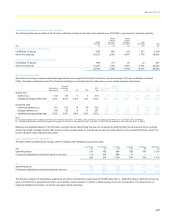 499
499 -
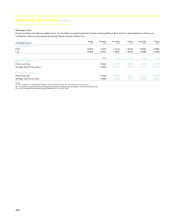 500
500 -
 501
501 -
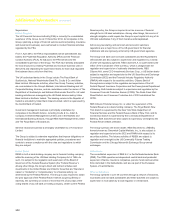 502
502 -
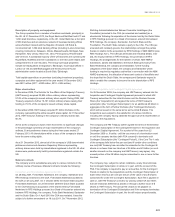 503
503 -
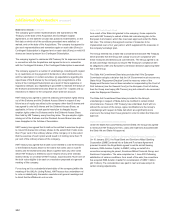 504
504 -
 505
505 -
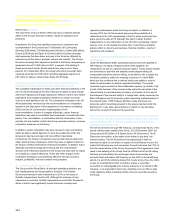 506
506 -
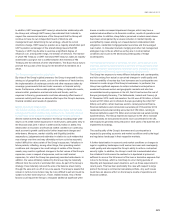 507
507 -
 508
508 -
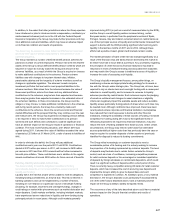 509
509 -
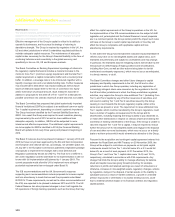 510
510 -
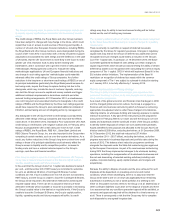 511
511 -
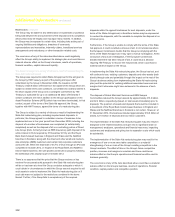 512
512 -
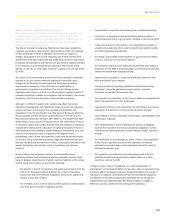 513
513 -
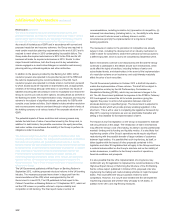 514
514 -
 515
515 -
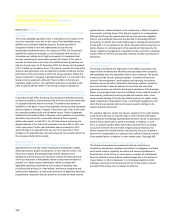 516
516 -
 517
517 -
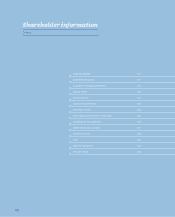 518
518 -
 519
519 -
 520
520 -
 521
521 -
 522
522 -
 523
523 -
 524
524 -
 525
525 -
 526
526 -
 527
527 -
 528
528 -
 529
529 -
 530
530 -
 531
531 -
 532
532 -
 533
533 -
 534
534 -
 535
535 -
 536
536 -
 537
537 -
 538
538 -
 539
539 -
 540
540 -
 541
541 -
 542
542 -
 543
543
 |
 |

Risk factors continued
Concerns about, or a default by, one financial institution could lead to
significant liquidity problems and losses or defaults by other financial
institutions, as the commercial and financial soundness of many financial
institutions may be closely related as a result of credit, trading, clearing
and other relationships. Even the perceived lack of creditworthiness of, or
questions about, a counterparty may lead to market-wide liquidity
problems and losses for, or defaults by, the Group. This systemic risk
may adversely affect financial intermediaries, such as clearing agencies,
clearing houses, banks, securities firms and exchanges with which the
Group interacts on a daily basis, all of which could have a material
adverse effect on the Group’s access to liquidity or could result in losses
which could have a material adverse effect on the Group’s financial
condition, results of operations and prospects.
In certain jurisdictions in which the Group does business, particularly
Ireland, there has been disruption during recent years in the ability of
certain financial institutions to complete foreclosure proceedings in a
timely manner (or at all), including as a result of interventions by certain
states and local governments. This disruption has lengthened the time to
complete foreclosures, increased the backlog of repossessed properties
and, in certain cases, has resulted in the invalidation of purported
foreclosures.
The trends and risks affecting borrower and counterparty credit quality
have caused, and in the future may cause, the Group to experience
further and accelerated impairment charges, increased repurchase
demands, higher costs, additional write-downs and losses for the Group
and an inability to engage in routine funding transactions.
The value or effectiveness of any credit protection that the Group has
purchased depends on the value of the underlying assets and the
financial condition of the insurers and counterparties
The Group has credit exposure arising from over-the-counter derivative
contracts, mainly credit default swaps (CDSs), and other credit
derivatives, each of which are carried at fair value. The fair value of these
CDSs, as well as the Group’s exposure to the risk of default by the
underlying counterparties, depends on the valuation and the perceived
credit risk of the instrument against which protection has been bought.
Many market counterparties have been adversely affected by their
exposure to residential mortgage linked and corporate credit products,
whether synthetic or otherwise, and their actual and perceived
creditworthiness may deteriorate rapidly. If the financial condition of these
counterparties or their actual or perceived creditworthiness deteriorates,
the Group may record further credit valuation adjustments on the credit
protection bought from these counterparties under the CDSs. The Group
also recognises any fluctuations in the fair value of other credit
derivatives. Any such adjustments or fair value changes may have a
material adverse impact on the Group’s financial condition and results of
operations.
Changes in interest rates, foreign exchange rates, credit spreads, bond,
equity and commodity prices, basis, volatility and correlation risks and
other market factors have significantly affected and will continue to affect
the Group’s business and results of operations
Some of the most significant market risks the Group faces are interest
rate, foreign exchange, credit spread, bond, equity and commodity prices
and basis, volatility and correlation risks. Changes in interest rate levels
(or extended periods of low interest rates), yield curves (which remain
depressed) and spreads may affect the interest rate margin realised
between lending and borrowing costs, the effect of which may be
heightened during periods of liquidity stress. Changes in currency rates,
particularly in the sterling-US dollar and sterling-euro exchange rates,
affect the value of assets, liabilities, income and expenses denominated
in foreign currencies and the reported earnings of the Group’s non-UK
subsidiaries and may affect the Group’s reported consolidated financial
condition or its income from foreign exchange dealing. For accounting
purposes, the Group values some of its issued debt, such as debt
securities, at the current market price. Factors affecting the current
market price for such debt, such as the credit spreads of the Group, may
result in a change to the fair value of such debt, which is recognised in
the income statement as a profit or loss.
The performance of financial markets affects bond, equity and commodity
prices, which has caused, and may in the future cause, changes in the
value of the Group’s investment and trading portfolios. As part of its
ongoing derivatives operations, the Group also faces significant basis,
volatility and correlation risks, the occurrence of which are also impacted
by the factors noted above.
While the Group has implemented risk management methods to mitigate
and control these and other market risks to which it is exposed, it is
difficult, particularly in the current environment, to predict with accuracy
changes in economic or market conditions and to anticipate the effects
that such changes could have on the Group’s financial performance and
business operations.
In the UK and in other jurisdictions, the Group is responsible for
contributing to compensation schemes in respect of banks and other
authorised financial services firms that are unable to meet their
obligations to customers
In the UK, the Financial Services Compensation Scheme (FSCS) was
established under the FSMA and is the UK’s statutory fund of last resort
for customers of authorised financial services firms. The FSCS can pay
compensation to customers if a firm is unable or likely to be unable, to
pay claims against it and may be required to make payments either in
connection with the exercise of a stabilisation power or in exercise of the
bank insolvency procedures under the Banking Act. The FSCS is funded
by levies on firms authorised by the FSA, including the Group. In the
event that the FSCS raises funds from the authorised firms, raises those
funds more frequently or significantly increases the levies to be paid by
such firms, the associated costs to the Group may have an adverse
impact on its results of operations and financial condition. At 31
December 2012, the Group had accrued £119 million for its share of
estimated FSCS levies for the 2012/2013 and 2013/2014 FSCS years.
506
Additional information continued
